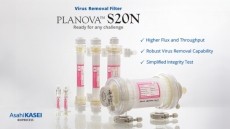Corn-based plastic heading for pharma packaging use?
and compostable, developed by biotechnology firm Metabolix and
agriculture giant Archer Daniels Midland, is to be developed for
pharmaceutical applications.
The two companies have set up a joint venture called Telles to commercialise the product, which will be sold under the Mirel Natural Plastics banner.
Although initially intended for food and consumer product packaging applications Telles plans to file for approval of their use in pharmaceutical packaging later this year or early in 2008.
"We're working toward approval now," said a spokesman for Metabolix.
Telles plans to bring its first commercial-scale plant for Mirel online in 2008 with an annual manufacturing capacity of 110 million pounds.
More than 350 billion pounds of plastic is produced each year and nearly 10 percent of total US oil consumption - about two million barrels a day - is used to make plastic each year.
Over the past year packaging suppliers have been introducing various forms of biodegradable plastics made from a variety of plants, in the main corn, based on projects that there will be a growing demand for environmentally-friendly packaging driven by consumers and recycling regulations.
Its manufacture contributes to the world's growing dependence on oil and greenhouse gas emissions, and conventional plastics add to landfill problems since they do not biodegrade.
Metabolix' founders, Oliver Peoples and Anthony Sinskey, were the first to show that the polymers used in the plastics - PHAs (polyhydroxyalkanoates - a naturally occurring form of polyester) - could be produced by recombinant organisms while working at the Massachusetts Institute of Technology during the 1980s.
In 2004, ADM and Metabolix announced a partnership to commercialize the company's PHA technology.
The company said Mirel can be used as an alternative to petroleum-based plastics in a wide variety of conversion processes, including injection molding, papercoating, sheet, cast film and sheet, blown film and thermoforming.
Is pharma ready to go green?
The pharmaceutical industry is under the same pressures faced by food and consumer products companies to reduce the use of non-biodegradable packaging, and has already started to adopt some biodegradable items, such as starch-based loose-fill packaging to replace conventional polystyrene.
These products have replaced more than half of the loose-fill polystyrene use in some markets, indicating the willingness of manufacturers to switch to a greener alternative, although a lack of resistance to moisture condensation has held back adoption for some applications.
Companies such as Innovia have also started to develop biodegradable films that can serve as alternatives to polyethylene in thermoforming applications, although these have yet to be adopted by pharma mainly because of the stringent validation required to demonstrate their reliability to regulators.















